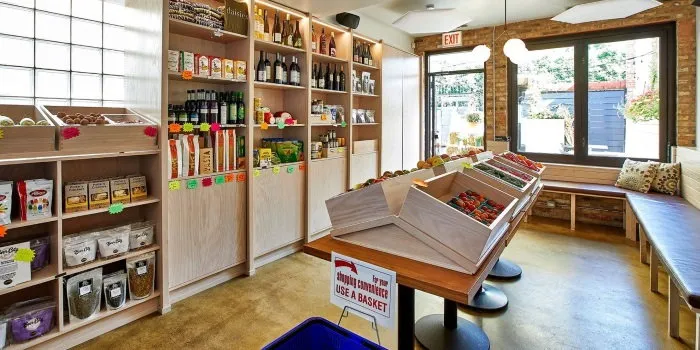
The Chicago Tribune just lately posted its new 2020 Readers’ Alternative Takeout Awards, inviting readers to vote on their favourite takeout from native eating places. The winner of the Greatest Meal Equipment, Daisies, had an attention-grabbing again story. When Chicago’s Logan Sq. farmers’ market was canceled, Daisies supplied its area to distributors, a lot of them the identical distributors the restaurant purchased from every single day. That meant, in line with the Trib, that friends had entry to all the identical components utilized in Daisies’ kitchen. The logical subsequent step was for the restaurant to assemble the components into meal kits. Excellent meal kits, contemplating the win.
After we take a look at the restaurant trade, it’s sometimes via a pre- and current day ‘pandemic lens’, particularly in terms of sustainability and native sourcing.
Earlier than COVID-19 modified every part, together with how we do enterprise, many shoppers dined out to eat nice meals in a fascinating atmosphere, and the story behind the dishes enriched the expertise. Friends involved in sustainability and sourcing needed to know the way the components of their orders had been grown or raised, and even how far they traveled earlier than being served.
How issues have modified
Consuming farm-to-fork meals was and nonetheless is standard, particularly amongst millennial and Gen Z friends, however issues are a bit totally different at this time in the best way these gadgets are made obtainable. Due to the pandemic, restaurateurs have needed to re-engineer menus to accommodate fewer on-premises clients and fill extra off-premises wants, scale back meals prices, and alter to smaller crews.
Nonetheless, there are clients who need regionally sourced merchandise, and the demand is constant to develop. And eating places need to provide them—the place and when potential—to the friends that crave them.
A brand new survey from digital meals buying community Buyer’s Edge Platform helps this idea. It discovered that 41% of shoppers stated they ordered extra meals from impartial eating places because the pandemic started, and 35% claimed discovering eating places that supply regionally sourced meals is essential to them. Among the many 500 respondents, supporting their native, impartial eating places stays important.
Explaining the recognition of ‘native’
“Everybody has a sizzling button by way of what they care about,” says Larry Reinstein, president and CEO of LJR Hospitality Ventures. “Shoppers usually need to spend their cash regionally. It offers them a great psychological feeling. They’re serving to care for the local people; that’s No. 1. In addition they need to know the place merchandise are coming from; that’s No. 2.
“There’s an affiliation that goes with shopping for a craft beer and understanding it got here from a small native brewer versus some massive facility far-off. Or it’s one thing so simple as consuming a dessert produced from apples that got here from the native orchard. Clients relate to the truth that it’s an area enterprise, and, fairly truthfully, that it’s higher for the atmosphere. The product didn’t journey hundreds of miles, and lots of people are involved in making a smaller carbon footprint.”
Causes for help
Dan Simons, co-owner of Farmers Restaurant Group, which owns and operates the Washington, D.C.-based Founding Farmers eating places, additionally thinks the variety of diners involved in native sourcing is on the rise—for a number of causes.
“Some of us fear in regards to the security and high quality of internationally sourced meals, whereas others are inclined to purchase American to help America,” he says, “and a few care in regards to the atmosphere, so there are various motivations. Once I communicate [virtually] on panels, I discover there’s numerous engagement from diners who need to help a extra resilient provide chain, and ask how their buying selections may help native jobs.”
Neil Russell, senior vp of Company Affairs and Chief Communications Officer for broadline foodservice distributor Sysco says the corporate expects the pattern towards native sourcing will proceed, benefitting restaurateurs and their friends.
“Sourcing native merchandise has many benefits, together with offering artisan merchandise that lead to menu innovation,” he says. “As extra individuals need to know the place their meals comes from, we’ll proceed to evolve our native sourcing applications.”
He notes Sysco seeks to scale back environmental impression by partnering with extra native producers and suppliers throughout the nation to lower the variety of miles cooks and restaurateurs need to journey to buy native items at varied farmers’ markets and different companies.
Provide vs. demand
Reinstein says in lots of instances shoppers are keen to pay extra for merchandise they will establish as native, which have a smaller carbon footprint, or that help neighborhood companies. It’s additionally been efficient in serving to operators cope with pandemic-related shortages, when demand’s been excessive, however provide quick.
“Apart from labor, the largest downside going through the trade is getting product,” he says. “Strive going to a restaurant and getting ketchup or pickles. These and different merchandise are arduous to search out. Manufacturing vegetation can’t sustain, neither can the truckers, and worldwide provides are powerful. If you are going to buy regionally, you could possibly truly wind up with a extra constant meals provide. The issue is while you’re in locations just like the Northeast and may’t get native produce year-round. However restaurateurs and their clients choose to buy native merchandise, like honey, jams, breads, and produce, once they can get it.”
4 recommendations on native sourcing
Simons, whose firm is understood for native sourcing and sustainability, says regardless of the pandemic, he’s doubling down on sustainability. He additionally provides these 4 recommendations on how finest to supply regionally:
- Construct relationships with native farmers and purveyors; that’s the important thing
- Align pursuits and search for win-win approaches
- Don’t make all of it about worth, or anybody aspect
- Collaborate
“Sustainability is extra resilient and much better for our full vary of stakeholders,” he says.







